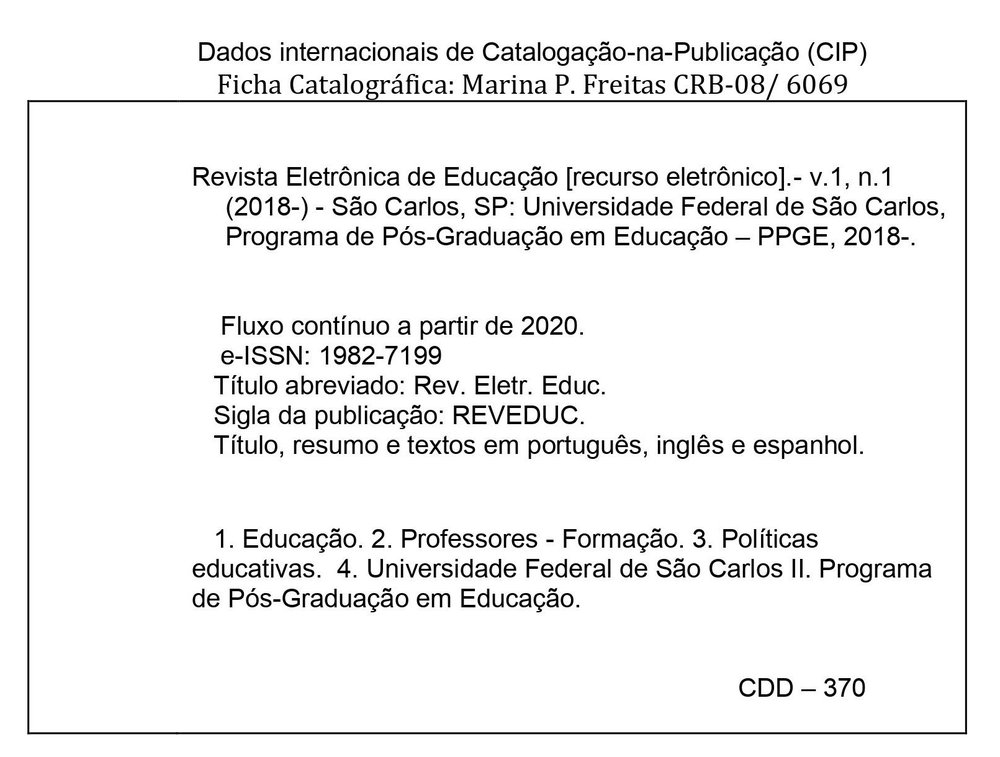Sobre a Revista
Foco e Escopo
A Revista Eletrônica de Educação é uma iniciativa do Programa de Pós-Graduação em Educação da Universidade Federal de São Carlos.
O seu principal objetivo é publicar artigos, ensaios e dossiês sobre temas que contribuam para o recrudescimento do debate educacional, bem como para a divulgação do conhecimento produzido na área.
É dirigida a pesquisadores, profissionais e estudantes da Educação. Somente serão aceitos para análise textos derivados de pesquisas empíricas ou teóricas realizadas por pesquisadores com titulação mínima de Mestre. Trabalhos de autores Mestrandos somente em coautoria com pelo menos um Doutor.
A revista é multilíngue, porém devido às configurações do site, resumo e palavras-chave aparecem apenas nos idiomas Português, Inglês e Espanhol. Os textos em idiomas que não o Português ou o Espanhol poderão ser traduzidos e apresentados na mesma edição.
O seu título abreviado é Rev. Eletr. Edu., que pode ser utilizado para citar o periódico em bibliografias, legendas, referências bibliográficas e notas de rodapé
Periodicidade
É uma publicação contínua desde 2020 em volume único anual.
Periodicidade (2018 a 2019)
jan./abr., publicação em janeiro
maio/ago., publicação em maio
set./dez., publicação em setembro
Periodicidade (2013 a 2017)
maio, publicação até 31/05
ago., publicação até 31/08
nov., publicação até 30/11
Periodicidade (2006 a 2012)
maio, publicação até 31/05
nov., publicação até 30/11
Sistema de Publicação
Para sua publicação a Revista Eletrônica de Educação utiliza o Open Journal Systems (OJS 3.3.0-8), sistema de código livre gratuito para a administração e a publicação de revistas, desenvolvido com suporte e distribuição pelo Public Knowledge Project sob a licença GNU General Public License.
Declaração de Privacidade
Os nomes e endereços informados nesta revista serão usados exclusivamente para os serviços prestados por esta publicação, não sendo disponibilizados para outras finalidades ou a terceiros.
Declaração de Acesso Aberto (Open Access Policy) e Gratuidade
Esta revista oferece acesso livre imediato ao seu conteúdo, seguindo o princípio de que disponibilizar gratuitamente, sem custo para o usuário e sua instituição, e sem necessidade de registro na revista ou embargo, proporciona maior democratização mundial do conhecimento científico.
A Revista Eletrônica de Educação utiliza a Política de Acesso Aberto (Open Acess Policy) e permite o acesso livre imediato e permite que qualquer usuário ler e baixar, e para copiar e divulgar para fins educacionais, sempre com a citação da fonte.
Copyright CC-BY-NC.
Para mais informações, consultar: https://br.creativecommons.org/
A partir de Janeiro de 2024, os artigos publicados apresentarão registro do tipo de licença adotada.
Declaração de adesão aos Princípios de Transparência e Boas Práticas
A Revista Eletrônica de Educação segue os princípios de transparência e boas práticas em todos os conteúdos publicados, em conformidade com os Principles of Transparency and Best Practice in Scholarly Publishing preconizados pelo DOAJ. São ainda utilizados o COPE’s Ethics toolkit for a successful editorial office COPE e as Diretrizes Básicas para a Integridade na Atividade Científica. Para saber mais acesse as Práticas Editoriais utilizadas por este periódico.
Direitos autorais e licença
Ao publicar seus artigos os autores concordam com os seguintes termos:
- Os autores mantêm os direitos autorais e concedem à revista o direito de primeira publicação com o trabalho simultaneamente licenciado sob uma Licença Não-Comercial de Atribuição Creative Commons que permite uso, distribuição e reprodução não comercial irrestrito em qualquer meio, desde que seja reconhecida e incluída a informação que a autoria do trabalho e a publicação inicial ocorreu nesta revista.
- Os autores podem entrar em acordos contratuais não comerciais adicionais separados para a distribuição não exclusiva da versão publicada do trabalho da revista (por exemplo, postá-lo em um repositório institucional ou publicá-lo em um livro), com um reconhecimento de sua publicação inicial nesta revista.
- Autores são autorizados e incentivados a postar seus trabalhos online (por exemplo, em repositórios institucionais ou em seu site e mídias sociais), pois isso pode levar a trocas produtivas, bem como a citações mais precoces e maiores de trabalhos publicados (The Effect of Open Access).
Arquivamento
Esta revista utiliza o sistema LOCKSS para criar um sistema de arquivo distribuído entre as bibliotecas participantes e permite às mesmas criar arquivos permanentes da revista para a preservação e restauração. Saiba mais…
Patrocínio Agradecimentos
Programa de Pós-Graduação em Educação da Universidade Federal de São Carlos
Agradecemos a contribuição de:
- IPEA - INSTITUTO DE PESQUISA ECONÔMICA APLICADA - 2012
- OBEDUC - Observatório da Educação - maio 2014
- PROEX/UFSCar - 2013
- FUNAPE/UFG/MEC/SECADI Concurso 001/2014
Ficha catalográfica da revista






